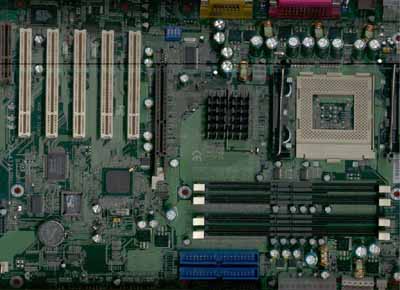Intel 850 Motherboard Roundup: September 2001
by Mike Andrawes on September 12, 2001 12:00 PM EST- Posted in
- Motherboards
EPoX EP-4T2A
|
ECS P4ITA |
|
|
CPU
Interface
|
Socket-423
|
|
Chipset
|
Intel
850/ICH2
|
|
Form
Factor
|
ATX
2.03
|
|
Bus
Speeds
|
100
/ 103 / 105 / 108 / 110 / 115 / 118 / 120 / 122 / 125 / 133 MHz
|
|
Core
Voltages Supported
|
Auto
Detect
-0.1 / -0.075 / -0.05 / -0.025 / +0.025 / +0.05 / +0.075 / + 0.1 / + 0.125 / +0.150 V |
|
I/O
Voltages Supported
|
Auto Detect |
|
AGP
Voltages Supported
|
Auto
Detect |
|
Memory
Slots
|
4
184-pin RIMM Slots
|
|
Expansion
Slots
|
1
AGP Slot |
|
On-board
Audio
|
CMI8738
Hardware Sound
|
|
BIOS
|
Award
Modular BIOS 6.00PGN
|
The 4T2A we received from EPoX was also an engineering sample, complete with some hand-soldered components on the board. Nevertheless, the board was definitely in good enough shape for our battery of tests.
Recently, EPoX started to include the Phoenix Net BIOS setup on top of the common Award Modular BIOS 6.00PGN. We’ve seen quite a few complaints about Phoenix Net in the forums, so we recommend you check there before considering a board with the “feature.”
There is a set of dipswitches on the board for setting the FSB speed, although the same settings are available in the BIOS. The 4T2A does not offer as many settings as the ABIT TH7 or the ASUS P4T, but they were sufficient for us to push the board to its limits.
As far as voltage tweaks go, the 4T2A definitely offers the best selection among the boards we have here. For CPU core voltage, you can set it at default or -0.1 / -0.075 / -0.05 / -0.025 / +0.025 / +0.05 / +0.075 / + 0.1 / + 0.125 / +0.150 V. For the first time on an i850 board, we get I/O voltage tweaks as well, which can come in handy when trying to improve stability at high FSB speeds. Last, EPoX also offers voltage tweaks for the AGP bus, which can also help with system stability under overclocked circumstances as well.
With all these voltage tweaks, we were able to push our board to 125MHz without compromising stability. This was actually quite disappointing since both the ABIT TH7 and the ASUS P4T, without any I/O and AGP voltage selections, went as high as 145MHz. This could be because we were using an engineering sample or there could be other factors involved. We’ll keep you updated as we get more information. Nonetheless, the board performed reasonably well in our tests and was very stable, showing that the board is very close to release.
The 4T2A uses the same HSF mounting mechanism as the ABIT TH7 and the ECS P4ITA for easy HSF installation. The AGP slot also features a locking mechanism ensure that AGP cards remain seated during shipping.

While most recent EPoX boards feature an onboard Highpoint HPT370 Ultra ATA 100 IDE RAID controller, it has not been included on the 4T2A.
In general the 4T2A is a slightly above average board, delivering respectable performance and stability. It also offers a lot of overclocking options, which could come in handy if you’re really trying to push your system to the max. Hopefully the retail version will be even better with regards to overclocking, although it probably won’t match the ABIT TH7 or the ASUS P4T in this department since the 4T2A only has settings up to 133MHz FSB.












2 Comments
View All Comments
sabboo - Thursday, February 11, 2021 - link
This was the board in my first pc. As a student it was a very basic setup but got me through uni. I spent money on it and pushed the processor as far as it could go. I had upgraded the memory but it was beyond my financial means to do anything great at the time. Tomorrow I pull it out of the loft and see what I can buy to make this the ultimate gaming machine of its time. Any suggestions on pci cards to amke this an amazing addtion to my home network would be appreciated.infinitebritt - Thursday, March 25, 2021 - link
Amazing to see a comment about the D850GB in 2021. I use this motherboard TODAY for work. My work machine has not been plugged into the net since 2006. I have not installed or changed anything. It should run FOREVER. I made some money with crypto this year so I'm looking to spend $100-$200 to replace the ATX case with something smaller and quieter. The case I've been using for 15+ years is HUGE and LOUD